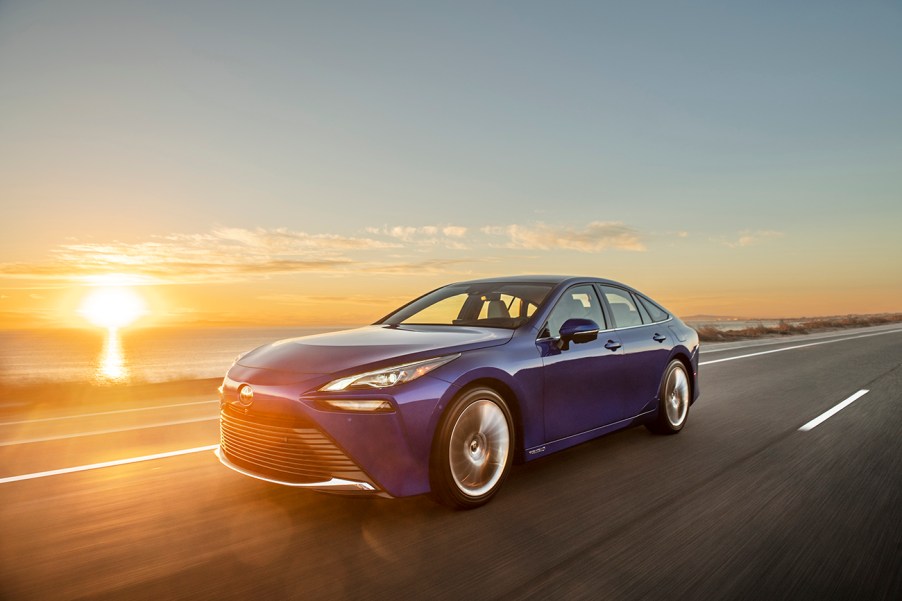
Hydrogen Fuel Cells vs Batteries: Which Is Better?
For decades automotive manufacturers have looked to hydrogen fuel cell technology as an alternative to lithium-ion batteries to power electric vehicles. Today there are actually consumers on the road driving hydrogen fuel cell vehicles. Cars like the Toyota Mirai and the Honda Clarity are attempting to make a case for hydrogen.
YouTuber Physics Girl (real name Dianna) has partnered with Toyota on a series of videos that go in-depth on hydrogen benefits. In her latest video, Dianna does a deep dive on the “hydrogen vs. battery” electric car debate by discussing the advantages and disadvantages of each power source.
Driving range: hydrogen fuel cell vs batteries

According to Dianna’s findings, the average battery-electric vehicle (BEV) averages about 200 miles of range. There are some exceptions when considering high-end BEVs like Teslas. The Tesla Model S Long Range model has an EPA estimated 405 miles of range.
The video explains that fuel cell electric vehicles (FCEV) have an average range of 300 miles, which is 100 more than the BEV average. The Toyota Mirai XLE has an EPA estimated 402 miles of range. If Dianna’s findings are any indication, FCEVs “win” when it comes to range.
Efficiency: hydrogen fuel cell vs batteries

Theoretically speaking, EVs should be much more efficient than combustion vehicles. However, which is the more efficient way to fuel an electric car? Is it hydrogen? Or lithium-ion batteries?
Dianna researched the energy density of batteries versus hydrogen fuel cells. Energy density is the energy in watts per kilogram of weight. By that factor hydrogen has an energy density of 35,000 watts per kilogram, while lithium-ion batteries have a density of just 200 watts per kilogram.

By that measure, hydrogen fuel cells have a big advantage over batteries. However, when looking at energy efficiency, the story completely changes. Energy efficiency is based on how much power is lost throughout harvesting the energy, transporting it, and its final use when an EV motor drives its wheels.
By that measure, lithium-ion batteries are 70-80% efficient, and hydrogen is only 25-30% efficient. Why is hydrogen so far behind here? According to the video, it takes more energy to harvest hydrogen (through electrolysis) and transport it on trucks. Since batteries are charged with electricity from power plants, transportation happens via wires, making it much faster and more efficient.
Infrastructure: hydrogen vs batteries

This round will be quick because batteries win hands down when it comes to infrastructure. FCEVs are still very much in their early adoption stages. Thus, the infrastructure for hydrogen is minuscule compared to gasoline and BEV charging stations.
In America, only certain states have hydrogen refueling stations for FCEVs, with California having the most. Yet, there are only 45 total hydrogen refueling stations in California. Compare that to the 5,000 super-charging stations in the state, and it is easy to see that hydrogen has a long way to go.
So who “wins”? Which is better? Hydrogen? Or batteries? The answer is they both do. As the video concludes, the world will need both technologies to completely remove our dependence on fossil fuels in the long run. It is just a matter of increasing the adoption rate for hydrogen and applying it properly to situations where it is best suited. FCEVs and BEVs will be commonplace if things work out, and the air will hopefully be much cleaner for it.


